2021: Volume 1, Issue 1 - Table of Contents
Facebook, Paedophile Hunters, and Surveillance – Mediated Transnational Abuse
Jason Lee
De Montfort University
Abstract
Facebook and paedophile hunter groups in the UK, US, and India are examined. QAnon is studied and how Facebook has aided their strength. The notion of the hunt is explored in the UK and India where hoaxes are common. Financial incentives and dataveillance are analyzed. Theological paradigms are extrapolated in terms of cultural theory and capital with the recognition surveillance leads to pre-determination and the eradication of the human.
1. Introduction - Justice of the People
1.1 Preface - Facebook and Surveillance
Whatever exists has already been named, and what man is has been known. Escclesiastes 6:11
For the eyes of the Lord range throughout the earth to strengthen those whose hearts are fully committed to him. 2 Chronicles 16:9
From time immemorial people had witnessed it all, and the creatures that circled God, with eyes all over them, was it the same in China, where cameras were being placed everywhere so all could be controlled from a central room, and the person watching, what about him, was he there, or did this space become a place that itself was controlled by that which it was observing? (Lee, 2015 202)
Concerns over Facebook, data privacy breaches, and algorithms are sensationalised by the media as convenient bogeymen. In the same way potential paedophiles are mediated as being the ultimate evil lurking behind every mouse click. In his first interview as head of MI5 Ken McCallum accused Facebook of protecting paedophiles and terrorists by giving them a "free pass" if encryption was end-to-end (Hamilton, 2021). Blaming private companies is a convenient way of covering up years of austerity in the UK. Negative media attention over Facebook has had an impact on the company. In 2017 there was an 8 percent drop in Facebook use in America and while globally this is not overly significant this was the first ever drop (Baer, 2018). (https://www.convinceandconvert.com/social-media-measurement/facebook-usage-declined-3-reasons/). An employer of Cambridge Analytica claimed they were using the data of 50 million US Facebook users without their consent to target voters with personalized political advertisements (Mejia, 2018) (4 facts about Facebook data whistleblower Christopher Wylie (cnbc.com)). In 2019 Facebook was fined $5 billion for violating consumers' privacy.

The fact Facebook paid this fine implies admission of guilt, but the issues were complex and this was not necessarily negative for the company. Active users then rose by 8 percent and advertising sales by 28 percent with Facebook's annual revenue reaching $55 billion (Anon, 2019) (https://www.bbc.co.uk/news/business-49099364). According to Facebook's former chief security officer Alex Stamos this ruling would advance Facebook as it would mean it would restrict the data flow of its 2.4 billion users rather than let them access third party apps or competing social networks (Anon, 2019) (https://www.bbc.co.uk/news/business-49099364). See Facebook Users By Country 2021 (worldpopulationreview.com) for an interactive take on Facebook uses and revenue.
At this stage it appeared social media users in America were more concerned about their data privacy than users in the UK or Europe which is understandable because the Cambridge Analytica data breach was mainly with American users. This changed with the COVID-19 pandemic in 2020 exacerbating existing apocalyptic belief, advancing satanic child sexual abuse conspiracy theories such as QAnon. Anti-vaccine and big-tech extremists gathered in European capitals. These belief systems desire the end of the current "evil" system, are akin to the evangelical theology of dispensationalism (Aaronovitch, 2021), and merge with a desire for a kingdom on earth run by the dictatorship of Donald Trump. In London in November 2020 this eclectic group attempted to break into hospitals, to undertake surveillance of wards they falsely believed were empty, documenting their activity on Facebook Live. A merging between legal and illegal activity on the internet has been at the centre of analysis concerning online activities since the internet's origin and paedophile vigilantism in the UK, US, and India encapsulates this nebulosity.
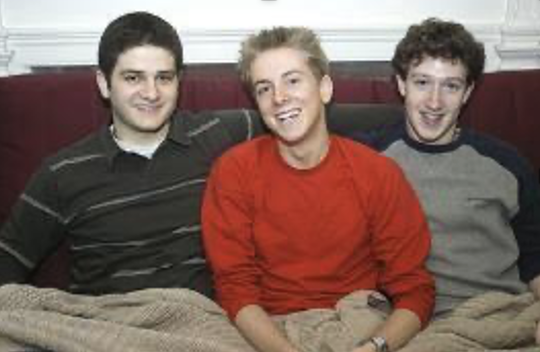
Even with whistle-blowing, fines, and the constant media focus and criticism from police and governments, it appeared Facebook could not be stopped from growing. Groups using Facebook to trap paedophiles have also grown gaining positive attention and acceptance as well as negative press. Despite all the negative press and bashing from governments, Facebook grew in part because it is an empowering tool for the personal surveillance of others and the self. Facebook holds photographic and other memories and in this sense is identity. The benefits were seen for many to outweigh any issues, such as data capture and surveillance, the irony being those ranting against big-tech and Mark Zuckerberg, satanic child sexual abuse, and the non-existance of COVID-19, were obsessed with using Facebook.
Through surveillance crime can be created as well as detected and thwarted. "In earlier times an event was something that happened ‑ now it is something that is designed to happen" (Baudrillard, 1993 41). Baudrillard was referring to how events occur as reflections of pre-existing media defined forms, events stage-managed and simulated. Paedophile hunters using Facebook do not necessarily operate outside the law, but claim the law is failing victims. This is where the personal empowerment argument takes hold. They can be considered transgressive, but some groups have self-identified as co-producers of official security forces working with the police. As with all transgressive acts they work towards, "the reaffirmation of the shared values of the social order" (O'Neal and Seal, 2012 5). Their existence, expertise and results often assert a higher value and reality than state sanctified activity through their immediate knowledge of online realities. Their possibly deeper understanding of Facebook and communities is often an asset that offers them leverage with the authorities in crime detection.
1.2 Hunting Monsters
The presence of these paedophile hunter groups has been felt and commented on in the United Kingdom, Germany, the Netherlands, Canada, the United States and Russia (Hadjimatheou, 2019). The growth of Facebook paedophile hunter groups parallels the growth of lawlessness on the internet followed by governmental attempts to reign in freedom online. Paedophiles were at the forefront of internet usage before most people had even heard of the World Wide Web (Lee, 2005).

Like their target, paedophile hunters set up fake profiles on Facebook posing as children (decoys), operating sting operations sometimes involving the police, trapping their prey and filming this on Facebook Live. Paedophile hunter groups take evidence for the police videoing real-world encounters for uploading on Facebook in their group's "paedo-gallery". The decoy does not necessarily steer the online conversation, but waits for the paedophile to make the first move to avoid accusations of entraptment. The success of these groups is undeniable, but there have been tragic mistakes (Booth, 2013) (https://www.theguardian.com/uk-news/2013/oct/25/vigilante-paedophile-hunters-online-police) (Saunt, 2021) (FALSE claims by paedophile hunters drove me to Beachy Head | Daily Mail Online). Intense media coverage of related child sexual abuse and abduction cases has also driven this phenomenon and understandably moved people to join these groups.

The abduction and sexual abuse of children are crimes that arguably generate the most fear and media headlines, increasing online traffic and raising advertising revenues. The disappearance of Madelaine McCann in Portugal in 2007 is the most mediated child disappearance of a UK citizen. Despite the British authorities attempting to place the blame on the Portuguese police, the failure to find Madelaine McCann furthered arguments concerning police incompetence leading to a distrust in the police regarding suspected child sex crimes and promoted vigilantism.

The UK police have been known to be involved in using child pornography and there has been unanswered police collusion with paedophile cases, such as that of celebrity Jimmy Savile (Lee, 2009 34) and the singer of Lost Prophets who was convicted of abusing children in 2013. Known to have molested hundreds of children "in plain sight" and "groomed a nation" (Davies, 2015), the media scandal around Savile and ongoing lurid focus on such stories led to further support for paedophile hunting groups. A collapse in trust with key institutions, including the BBC and central government, led to support for the American-grown QAnon movement in 2019. With streamed entertainment an ever increasing high-valued commodity paedophile hunter activities have an entertainment value, offering excitement and a narrative arc involving surveillance, ensnaring, capturing, and display of prey. This is exponential, given the ease of ability to share activities on Facebook. This sharing includes those interested in this phenomenon, but not directly part of it. Ethical dilemmas concerning the entertainment value of this activity are significant and there are also pertinent related legal issues. By sharing the video footage of a potential paedophile being caught this may mean more than just approval of the process. While the ease of Facebook use is one of its pluses, there is a negative as this can lead to misuse, over-use, and mistakes, prejudicing future cases. Facebook have arguably been slow to clear up its platform blaming this on their size. This includes trying to prevent online child sexual abuse and child pornography. There are elements of performative sportization here concerning the pursuing of the �animal� (Elias and Dunning, 1986). Through these transformative transgressive acts a carnivalesque element is overt, the performative element clear within the Facebook framing of the hunt.

The legality of these groups and their methods have been questioned (Purhouse, 2020). In terms of the protection of privacy in July 2020 the UK's Supreme Court ruled that the, "reprehensible nature of the communications means they do not attract protection" (Brooks, 2020). In 2018 there were approximately 75 groups and by 2020 90 groups in the UK performing 100 hunts a month; during the first month of the first COVID-19 lockdown (from 16 March 2020) 16 incidents were recorded with 15 of these being "e-activism" (Dearden, 2020). Like a trophy on a wall in a hunting lodge, once caught the image and video of the hunted is displayed in the "paedo-gallery" on Facebook. Groups sometimes work collaboratively. One paedophile who thought he was dealing with five young girls in Wales was caught by five hunting groups (Day, 2020) (Five separate paedophile hunter groups caught out man trying to send explicit messages to underage girls - Wales Online). Another paedophile sexually communicating on Facebook with what he thought were girls as young as nine was caught by seven groups, his capture on Facebook Live (Cunningham, 2021) (https://www.edp24.co.uk/news/crime/paedophile-hunters-caught-michael-camp-diss-grooming-children-7070398).
Often these groups originate in areas where opportunities are low offering a route to an activity thought worthwhile, offering meaning, and providing a service. Senior police officers claim these groups might be infiltrated by paedophiles and are operating in their own interests not that of children (Anon 2, 2019) (Police concerns over rise of 'paedophile hunters' - BBC News), but those lower down the ranks value their use. We can see how Facebook is an ideal platform for this culture going deeper than hunting animals given, as DCI Bob McLachlan, former head of the Paedophile Unit at New Scotland Yard explained, the paedophile symbolises the "monster in men" (Long and Mclachlan, 2003 76). Such hunts may destroy these real or imagined monsters given mistakes have been made, but they clearly have had signficant results. There could be a strong arugment supporting the view what are a few mistakes given the majority of these groups operate within the law. The dream of cleansing and purity is at the heart of this activity, as is revenge, and we shall see it is embedded with a wider aesthetic relating to theology and ethical theory.
This movement has parallels with guerrilla filmmaking, using amateur surveillance techniques to cleanse the streets and the internet of paedophiles. Their activity is a challenge to the law and law enforcement, promoting the notion that both are not working properly, hence they challenge the social order. This is also a challenge to established filmmaking practices and the power of mainstream media with Facebook the perfect platform for this. Vigilantes are often viewed as heroes, with many extreme cases of vigilantism against child sex offenders (Warder, 2014) (https://listverse.com/2014/01/30/10-controversial-cases-of-vigilantism/). The government is blamed for cutting the police services, which then legitimizes these groups. This legitimization was achieved for a period in the UK until an announcement was made at the UK's Independent Inquiry into Child Sexual Abuse (IICSA) in May 2019 that the police would not collaborate with these groups, but were still willing to receive evidence from them (D.5: Detection | IICSA Independent Inquiry into Child Sexual Abuse).

Dark Justice (Dark Justice) are the most famous paedophile hunting group in the UK following a number of documentaries featuring them including one in 2016 when they were "unmasked" (Paedophile hunters Dark Justice are to be unmasked in new documentary - Chronicle Live). Founded in May 2014 it consists of two activists funded by donations and they were invited to be part of the official inquiry into child sexual abuse in the UK mentioned above. This inquiry was broadcast live and a statement was read out on their behalf stating the police were incapable of tackling the problem and they never upload videos of capturing paedophiles until a conviction is secured. According to their own statistics of the 182 arrests due to their actions 106 have been convicted with 56 receiving a custodial sentence (Dark Justice, 2019). No one can argue with this record and their argument is they assist the police and do not compete. Between 2015 and 2018 it was estimated that half of all recorded offences of meeting a child following online grooming in the UK were brought by these type of paedophile hunters (Shammas, 2018) (Cops now rely on paedophile-hunter vigilantes in HALF of grooming cases (thesun.co.uk)). This is just one indication of how powerful these groups became and Facebook is essential to their operation and success. The facts support many of the claims of these groups, especially with regards to the police not having the necessary resources. The UK's Home Secretary in 2015 Teresa May cut the police by an estimated 22,500. In April 2019 the government White Paper "Online Harms" was published outlining the direction with online regulation. While the government attacked technology companies over online child sexual abuse, they praised the way Google, Facebook, Microsoft, Twitter and Apple, had all been involved with counter-terrorism.
1.3. Conclusions – Surveillance Observed

How much of life needs to be observed and streamed live, or is this a dystopian view as interpreted via the series Black Mirror(Charlie Brooker, 2011–)? Surveillance developments are part of the militarisation of the modern nation state (Dandeker, 1990). In 2003 US officials announced that American military operatives would be located in bases in Europe, focusing on child sex crimes and terrorist activity combined (Lee, 2005). These risk classifications, "infuse moral certainty and legitimacy into the facts they produce"; people then accept them as, "normative obligations and therefore as script for action" (Ericson, 1997 6). Any nuances of the human is anathematized, data holding a higher reality than the human. Simulation has been positioned as the critical contemporary category of social control rather than surveillance (Bogard, 2006). But can the two be divided?

For Leibniz, drawing on Plato, events are known prior to their external existence, but the overload of information in the current world takes this a step forward.
Just as the political economy is a gigantic machinery for producing value, for producing signs of wealth, but not wealth itself, so the whole system of information is an immense machine for producing the event as sign, as an exchangeable value on the universal market of ideology, of spectacle, of catastrophe.... The singularity of the event, irreducible to its coded transcription and its staging, which is what quite simply constitutes an event, is lost. (Baudrillard, 2005 94-95)
This is results in a nihilation of difference. Surveillance is embedded in cultures as far back as censuses began, positioning people in the functional zone, creating both the non-human outside that zone and the non-human in the zone, given autonomy is deleted under observation. The observed controlled within this zone are defined-owned by the power possessing surveillance and data, becoming a unit and de-humanized. The subject is owned by the object, rather than vice versa (Lee, 2015 202). Passive surveillance and dataveillance (Clarke, 1991) are central to the analysis of these owned consumers, generating data to judge a society. Resistance includes moving away from the methodological individualism and biological determinism present in technology systems (Ogura, 2004 292). There is a problem with surveillance, especially in zones that are supposed to be about the advancement of knowledge, such as universities, where freedoms get curtailed (Lee, 2013) (Three-D Issue 21: Terminal Thinking: Corporate University and Creativity – MeCCSA).
In the surveillance assemblage identity becomes associated with data doubles, flows and abstractions (Geesin, 2012 79). Identity becomes contested and is not an objective characteristic. Sergio Rizzo (2008) outlined the correlation between security and surveillance; "power is not owned or held, but instead flows through multiple sites" (Willis, 2006 69). Monitoring and control are behind these data doubles (akin to the decoys used by paedophile hunter groups and police on Facebook), with life changes and prospects affected by the ways in which we are identified by our coded-identities (Los, 2006 74). The constitution of identity can be seen as an act of power (Laclau, 1990 72). As with paedophiles and their hunters on Facebook, individuals can occupy multiple identities which should not be thought of as coexistent but constant, entailing "multidirectional subversion" (Mouffe, 2005 77).
2. Further Case Studies
2.1 UK & America Paedophile Hunting
The main period of media attention focused on these groups was 2012 to 2019. In 2012 a 19-year-old in the UK was arrested for posing online as a fake agony aunt to lure people (Anon, 2012) (https://www.mirror.co.uk/news/uk-news/paedos-net-trap-455647). Police in the US were posing as paedophiles during the same period (Schroeder, 2013) (https://eu.usatoday.com/story/news/nation/2013/07/26/cop-poses-online-as-teen-girl-to-catch-sexual-predators-/2591619/). In Derby, England, a man was using his daughter to capture paedophiles, offering photographs and details of her as bait (Staff Writers, 2015) (Brendan Collis: Father uses daughter Leah to catch paedophiles (news.com.au)).
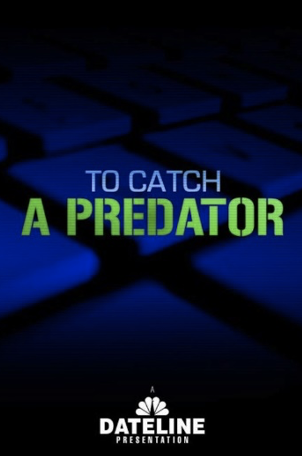
Vigilantism as entertainment has an international appeal. To Catch a Predator (2004-2007) broadcast a total of 12 sting operations in the US after adults posed online as 12 to 15-year-olds. Legal opinions on these vigilante group vary within the UK. Their involvement may have meant those guilty were not convicted. In 2018 110 alleged paedophiles in Northern Ireland identified by paedophile hunter groups were not charged, QC Mark Holland noting, "innocent until proven guilty was a fundamental principal in law" (Kearney, 2018) (https://www.bbc.co.uk/news/uk-northern-ireland-43049316 ). In England a paedophile hunter gang of eight members, part of N-Force Justice, attacked Christopher Bradford, who was then convicted of attempting to: incite a child to engage in sexual activity; make sexual communication with a child; and inciting a child to watch a sex act (Marshall, 2018) (https://www.bbc.co.uk/news/uk-northern-ireland-43049316 ).
Online surveillance is multi-layered, explored in feature length documentaries and television shows in the UK, US, and Europe. Scalps included: Mark McKenna (38), who had sent explicit photos, a video and many messages to someone he thought was 11; Paul Patten (38), who sent naked photos of himself to a vigilante posing as a 13-year-old girl; and Andrew Sealey (39), who was caught at a theme park telling one fake teenage, "it's OK you being a virgin and 15, I don't mind" (Robinson, 2016) (https://www.dailymail.co.uk/news/article-3680923/Caught-video-Married-paedophile-faces-jail-vigilantes-trapped-trying-meet-children-sex-Peppa-Pig-amusement-theme-park.html). All were convicted in court with evidence from vigilantes forming part of the prosecution. Vera Bard QC of the Association of Police and Crime Commissioners believed closer links with these groups was benign (Perraudin, 2017) (https://www.theguardian.com/society/2017/apr/24/paedophile-hunters-jeopardising-police-work-child-protection).
The groups can be effective if they make sure their evidence stands up legally. But for senior officers there is the question over evidence gathering, child safety, and the danger to the public. The online vigilantes' profiles mirror those paedophiles that they seek – mainly men in their mid to late 30s, white and working class. We can view the police as part of the "top", but there is a dependency here. These vigilante groups are part of the low-Other, that is, "despised and denied at the level of political organization and social being whilst it is instrumentally constitutive of the shared imaginary repertoires of the dominant culture" (Stallybrass and White in Jenks, 2003 172). By 2019 cases of this nature were still being reported in a variety of forms, but stories around this phenomenon were reducing. In America a 37-year-old man was accused of posing as a boy online seeking, "inappropriate photos of girls" (ABC, 2018) (https://www.abc12.com/content/news/37-year-old-accused-of-posing-as-young-boy-online-seeking-inappropriate-photos-of-girls-462131393.html). Under pressure Facebook were beginning to intervene. The topic had not disappeared, but more extreme examples were commented on by the media and general press. The Harvard Gazette in 2017 published work on the need for privacy given surveillance was now the business model for the internet (Mineo, 2017). In June 2018 the law changed in America to enable further tracking of offenders by multiple technologies.

As well as print and online media focusing on Facebook and paedophiles, TV has tackled the subject including group hostility and surveillance. For example, the UK's Dave Channel broadcast "Cops UK – Bodycam Squad" on 3 March 2019. This programme is one of many that fits within the genre "extreme television", early examples being ITV's Police, Camera, Action! and Fox TV's World's Wildest Police Videos in the 1990s (Lee-Wright, 2010 139). Surveillance, entertainment, and the hunt again blurs. On the outskirts of Nottingham, England, in an under-priviledged area a police dog-handler with a body camera attends an incident at a shopping parade where a suspected paedophile is being held captive in a phone-box. Soon the baying paedophile hunting mob, with their phones inevitably weaponised, grows to around 20 screaming for vengeance. Items are thrown at the police officer who manages to get the hunted out of the phone-box. The officer requests for backup, who are slow to arrive, and he realises this is out of hand. This is all recorded on the officer's bodycam and the mobs' mobiles for our entertainment. The police officer rightly call this "a witch hunt".
One man claims the accused is a "known sex offender" who already has a reputation, that he was looking through peepholes at children in a park, making videos on his phone. Women are shouting and pushing, ordering the policeman to act. One mentions her young children are there in need of protecting rather than the "paedophile". The officer cannot put the suspect in his police car due to his dog. This is maximising the conflict for dramatic entertainment and impact. Eventually back up arrives and with some difficulty the crowd is dispersed with the shouting continuing. Facebook and social media and technology had been at the heart of this event and fantasy has blurred with reality. The police discover the accused man has no criminal record, is not a paedophile, does not own a phone or laptop, and there are no peepholes in his fence. As the dog-handler makes clear initially, it does not matter if the man is innocent – in the community he is a marked man. The mob, fed with media stories about "dirty old men" and other online fabrications, have done their own surveillance using Facebook, fallaciously convinced of the evil other encroaching on their territory. Because of the focus on celebrities and paedophile gangs in the mainstream media and online, the facts are overlooked; 80 percent of abuse is carried out by someone known to the family (https://learning.nspcc.org.uk/child-abuse-and-neglect/child-sexual-abuse). This staggering figure is anathema to most who continue to believe that child sexual abuse is committed by strangers. The love of the hunt here spurs them on.
For his own safety the police rehouse the man. The man has learning difficulties, making him vulnerable and easy prey, and he is elderly doubling his vulnerability. No member of the public in this instance is interested in the truth. Rage rules energizing them, having a suspect who they can hurl abuse at building their power, plus the police are a focus for mob anger who are just as "evil" accused of protecting the "paedo". Some of the crowd appear poor and disabled, making them similarly vulnerable. This unifying anger against the accused and the police gives them a high-level of performative agency making the weakest in society collectively powerful. There is the parallel here with online paedophile hunters, normally poor and uneducated, who gain agency and a sense of meaning through this carthartic display, and with the mobs in previous centuries at public executions.
End of the panoptic system. The eye of TV is no longer the source of an absolute gaze, and the ideal of control is no longer that of transparency. This still presupposes an objective space (that of the Renaissance) and the omnipotence of the despotic gaze. (Baudrillard, 2006 29).
This is an edited programme creating a narrative to enhance the conflict for dramatic purposes. Observation and transparency no longer correlate. The mob want to observe but believe the worst before the event has taken place to channel the injustices in their own lives. In this sense they create the event and the suspected paedophile. Violence breaks out and the police dog-handler thinks his presence makes it worse. Both the accused man and the man who trapped him have rung the police. It had been suggested selective and massaged videoed accounts would diminish in popularity (Lee-Wright, 2010 131). The reverse has occurred with Facebook's growth. Baudrillard considered fake events in the context of war reporting with the transfusion of reality into the cinematic (Baudrillard, 2005 97). The herd instinct is often not to help someone involved in a violent attack, but to video it with the video-data a higher reality than the physical. Dehumanization results. But, as we see next, having an event on Facebook Live functions as a form of evidence which leads to convictions for real crimes.
2.2 The Satanic Child Sexual Abuse Cabal – QAnon and Related Conspiracies
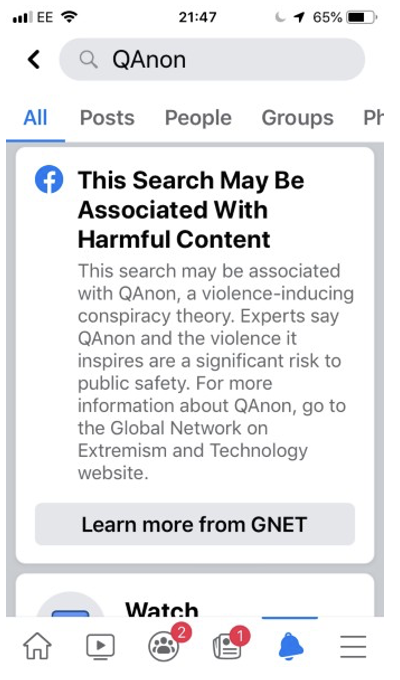
According to Facebook's own analysis 64 percent of extremist membership was driven by their algorithms; by June 2020 there were more than 3 million aggregate followers and members of QAnon on Facebook with Facebook alrogithms actively introducing Facebook members to them, even those who showed no interest (Wong, 2020) (Down the rabbit hole: how QAnon conspiracies thrive on Facebook | Facebook | The Guardian). During the 2020 US presidential election the QAnon movement gained further attention for its cultish support of Trump. They maintained Trump as "king-paedo-hunter" was tracking down satanic paedophiles within the elite, such as Hollywood stars like Tom Hanks along with the Clintons and related Democrat sympathizers connected to high-tech companies. In 2021 in California this conspiracy turned its hatred more overtly towards the Chinese and Jews with areas that witnessed high levels of support for the Black Lives Matter movement experiencing an increase in QAnon support (Chabria, 2021) (QAnon shifts, spreading Chinese and Jewish conspiracy myths - Los Angeles Times (latimes.com).
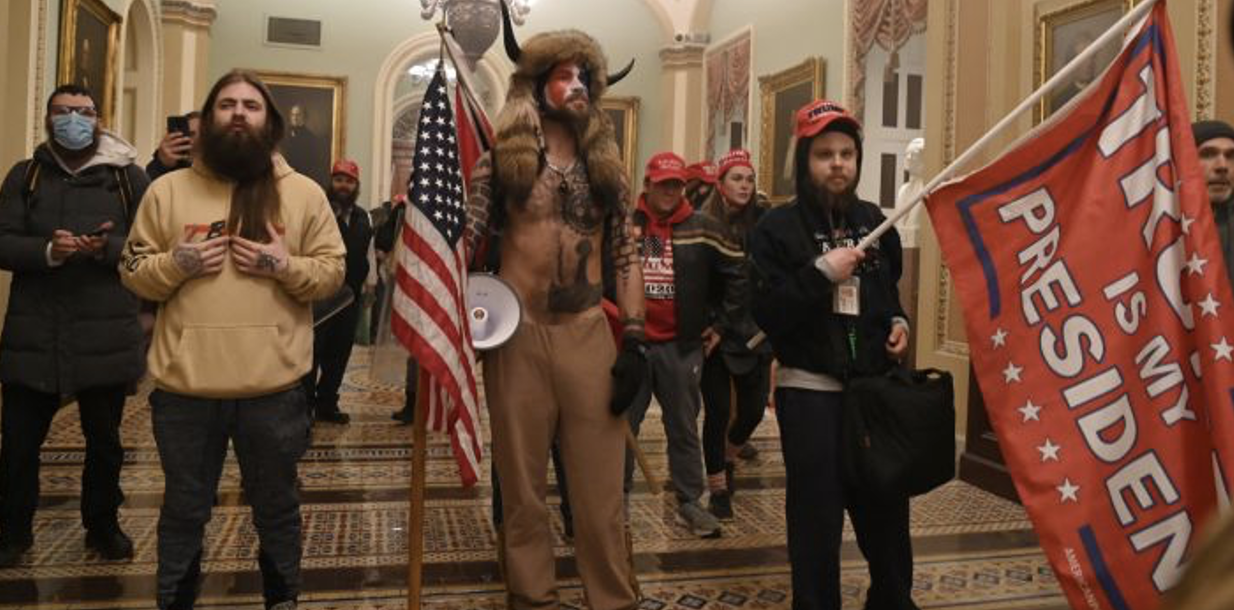
Following Twitter banning Trump Facebook followed suit interpreted by conspiracy theorists like QAnon supporters as yet another attempt by big-tech to silence "the truth". Since November 2020 Facebook had removed 60,000 related conspiracy pages, but people migrated to the messaging app Telegram, 8chan, and other platforms. One myth of this group is that of fighting paedophiles who in their belief control all the power. Believing in this offers certainty in an uncertain world: evil satanists are out to steal your children and Trump will save you. The peaceful inauguration of president Joe Biden on January 20 2021 demolished a central belief of QAnon that on that day Trump would declare martial law and all enemies would be executed. The media still craved more of the showman, predicting his return under the Patriot Party banner. Trump's return in May 2021 on the internet, initially foretold by his team as involving a new form of social media communication to dominate their foes, was a mere website. Facebook continued to prohibit the QAnon king a platform.

Given its dissenter origins and current laws the US has been seen as a zone for crackpots, including cults, but unusual figures supporting a group hunt for "satanic paedophiles" have also arisen in the UK. This includes John Mappin. As well as owning Camelot Castle Hotel Cornwall, Mappin is a QAnon member hosting his own online TV channel spreading related conspiracies; he was accused of promoting anti-Semitic conspiracy theories about George Sorros (Harpin, 2020) (British businessman who flew QAnon flag over hotel shares false Soros claims - The Jewish Chronicle (thejc.com)).

Despite numerous warnings, Facebook allowed these groups to gain traction. In October 2020 it banned them terming QAnon "militarized". Arguments that this is technology censorship are defeated when we consider how these groups then disguise themselves on Facebook by altering overt names, or migrating to other platforms. Online conspiracies overlap, spreading through overt deep use of social media platforms. Former local politician Simon Parkes, from Whitby, England, claimed during the storming of the American government on January 6 2021 Bill Gates was about to be arrested. Parkes has 100,000 followers on Bitchute, the video site popular with neo-Nazis, and more than 650,000 on YouTube. At one point he claimed his mother was a nine-foot alien and he had sex with aliens. When his predictions about Gates were proven wrong Sebastien Gorka, former advisor to Trump, tweeted "QAnon is dead, thanks in part to Simon Parkes. Good" (Yeomans, Ball, and Ellson, 2021 13). But then the danger is these people then move to more extreme, less monitored, underground sites.

According to Hope Not Hate, David Icke was possibly the single largest promoter of conspiracy theories connected to COVID-19 on Facebook. He was banned from Facebook in April 2020. Icke had already been promoting similar myths to QAnon: that a cabal of senior global leaders existed to sexually trafficking children (Lawrence and David, 2020 17) (qanon-report-2020-10-FINAL.pdf (hopenothate.org.uk)). Breaking lockdown laws with the illegal "Stand up for Children" marches across the UK on September 5 2020 with known connections with the far right, London witnessed how ideologies concerning COVID-19 denial entwined with belief in a global satanic paedophile ring. Despite Facebook attempting to ban the likes of Icke and QAnon, advertisements for events featuring Icke still appeared on Facebook, Icke declaring, "I know the truth." For a fee – so could you know the truth from the self-declared son of the Godhead – plus Facebook was also getting a fee for the advertising revenue connected to his self-promotion. What previously was thought of as paranoid and delusional was the new normal and Facebook had been at the heart of this. For centuries of course Jews were demonized and still are (Lee, 2018). Part of this othering was seeing them as sexually transgressive and a threat. According to psychiatric bible The Diagnostic and Statistical Manual of Mental Disorders, a belief is not delusional when it is held by a person's "culture or subculture" (Bridle, 2019 208). Those who the psychiatric establishment previously considered delusional can "cure" themselves, "by seeking and joining an online community of like minds" (Bridle, 2019 210). Those outside the social media group might consider these beliefs absolutely insane, but medically this "madness" is now sanity. Facebook and other platforms enhanced these subcultures by normalizing what was previously believed to be abnormal systems of belief.
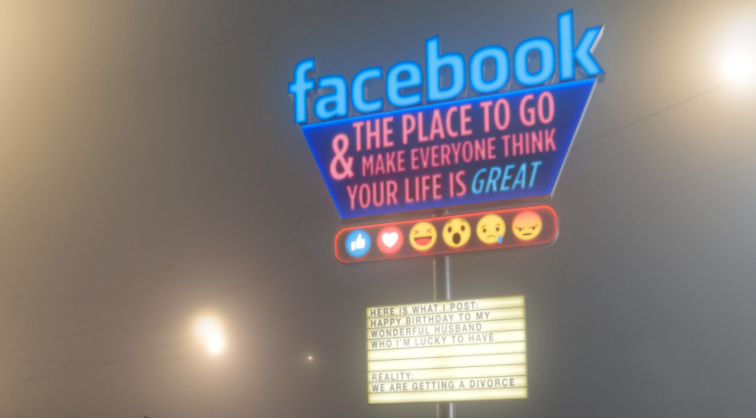
While Facebook eventually put warnings on any information shared about COVID-19 and about the dangers of QAnon, as it did regarding the American presidential election in 2020, this was just a warning, a pause for thought. It did not block information shared, however false. Believing a satanic cabal sexually abusing children is at the heart of the global elite is nothing new and has a long history, but the spread and feeding of these beliefs on social media was a new frenzy. This galvanized support for a coup in America by believers.

Facebook was slow to take action and only when some nation states threatened to take action against the platform did it finally make amends in a pre-emptive attempt to reduce falling advertising revenues. Even after Trump left the Whitehouse, media commentators still maintained that Trump and his followers should be allowed a platform on social media, and Facebook were removing their civil rights. This conspiracy spread algorithmically by Facebook was at the heart of this, leading to the deaths at Capitol Hill on January 6, 2021.

For many this is essence of the American way; anything that stands in the way of this is anti-American and proof of their conspiracy. Where does this leave us in terms of trust? At least there is a movement in the right direction in the UK. In England and Wales confidence in local police rose significantly from 47 percent in 2003/04 to 62 percent in 2011/12 to 75 percent in 2018/19 (Confidence in the local police - GOV.UK Ethnicity facts and figures (ethnicity-facts-figures.service.gov.uk)).

In America many in the Black Lives Matter movement originally called for a defunding of the police given the atrocities against the black community. In sociological terms, it has become a platitude that every man is hunting children online in order to abuse them framed as moral panic (Lee, 2005). The fiction film Hard Candy (David Slade, 2005) interestingly reverses this notion of "victimhood" and "vulnerability", with an underage girl meeting a groomer and torturing him (O'Neal and Seal, 2012 54).
Despite QAnon's hatred of Facebook as embodying the evils of "big media" and a core part of the satanic child sexual abuse cabal, Facebook was home to many fragmented communities who found a voice and community and identity through belief in conspiracy theories. This new meta-narrative was a powerful contemporary force in creating individual private and group identities. While local UK paedophile hunter groups used Facebook as a tool to capture potential child sex offenders and publicly shame them on galleries, QAnon groups used Facebook to galvanize ideologic belief, capture new believers, and spread ideology. On one level this was not difficult given this belief already existed. For example, in Britain there had always been a false belief in occult activity damaging children. One mother in London in 2015 turned a whole middle-class community against her ex-husband with false allegations of satanic child sexual abuse (Wright 2015) (Mum "who tortured kids" to invent Hampstead Satanic abuse fantasy loses appeal | Hampstead Highgate Express (hamhigh.co.uk)). People like Icke used Facebook more professionally to ensnare those who had an affinity with his belief system, capturing via Facebook those who were now certain a real satanic paedophile cabal were in charge and this nightmare battle gave them meaning.
Labelled a domestic terror threat in the US, across the US and Europe, members of QAnon and related groups were actually involved in abducting children, murder, and attacks. Due to the fear that satanic child sex abuse cabals were going to steal their children, driven by social media people turned to drastic action thinking they were protecting their children. An informative article in the UK newspaper The Sun revealed incidents connected to QAnon and criminal activity transnationally (QAnon fuels child kidnappings from France to US as brainwashed snatchers try to 'save kids from blood-drinking paedos' (thesun.co.uk)). For example, Neely Petrie-Blanchard shot dead her lawyer believing he was part of a government cabal abusing her children while many other parents claimed their estranged partners were satan worshipping paedophiles and took extreme action (Holloway, 2021). QAnon's influence was now profound, propelled originally via Facebook. This was no longer a fringe US cult obsessed with Donald Trump as a saviour figure, but through social media part of a larger desperate transnational movement. Even though Facebook banned QAnon and issued warnings on connected content related QAnon videos still circulate on the platform which galvanizes further support.
2.3 India
Vigilante groups are an international phenomenon with Facebook and Facebook owned technologies enabling them. Sub-cultural groups in the UK hunting paedophiles via online techniques are normally uneducated, with some members having a background of being abused plus there can also be a relationship with the far right (Lee, 2018). QAnon also takes a far right position. Exposing possible paedophiles through online technology has become part of an agenda linked to anti-immigration rhetoric, especially against Islam. This propaganda promotes the notion that the singular problem is the outsider, the evil other believed to be invading your country, indoctrinating and raping your children. Rhetoric is switched so the white working class are constructed as the "outsider" in their "own" country and they are the victims who are discriminated against.
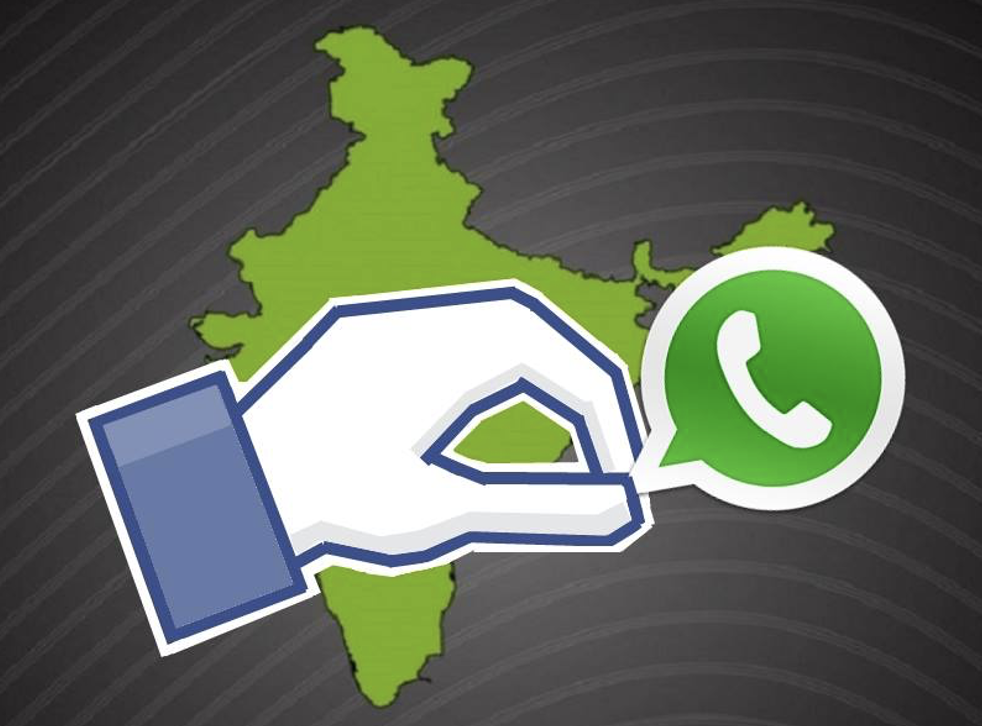
Similarly, Indians have used Facebook owned WhatsApp to fuel vigilante behaviour. The government have attempted to intervene over privacy settings. India has over 400 million users of WhatsApp, the platforms largest market, the communications service used by approximately one-third of the planet (Iqbal, 2021). As with the UK, if the police are under resourced, people feel the right to take things into their own hands with an overt lack of faith in the legal criminal justice system. This leads to a form of machinic enslavement, informational technology a human-machine system (Deleuze and Guattari, 2011 506). Children are kidnapped to steal their organs and hoax videos are spread on Facebook and WhatsApp, such as false allegations of child sexual abuse. This form of communication technology breeds intimacy, fuels emotion, and spreads fear. Often here people have no other mechanism to examine the evidence to see what is true. One way of tackling this is to limit the number of people allowed in Whatsapp groups, this being five in India.
It is no wonder that the WhatsApp rumours which were spread in Karbi Anglong district mentioned the entry of a large gang of child-lifters from Bihar who were dressed as woman or were transgender, and had long hair. This is the main point of difference between the myths of witches and child-lifters. The witch is always from the community and witch-hunting has also led to many mob lynchings in Assam. (Madrigal, 2018) (https://www.theatlantic.com/technology/archive/2018/09/whatsapp/571276/)
Administrators of social media groups in India can be imprisoned for sharing, "offensive messages", critics arguing this can be used to supress free speech. But blaming Facebook and social media companies in this context can avoid the cultural reality. While communal violence has increased from 751 incidents, resulting in 97 deaths in 2015 to 822 incidents and 111 deaths in 2017, violence peaked in 2009, before WhatsApp was prolifically used (Madrigal, 2018). So it needs to be acknowledged how these systems can prevent crime.
Governments and the BBC, which has a vested interest in attacking other forms of media, squarely blame social media companies. There is the myth of the child-lifter, known as xopadora, which crosses class and geography divides; child trafficking overall is on the increase (Ahmed 2018) (https://thewire.in/rights/assam-lynching-child-lifting-rumours).
Because the child-lifter is not from the community, this has led to attacks on individuals which have been based on pure xenophobia. In the gruesome videos that are released post the lynching in Karbi Anglong, one of the victims could be seen pleading with bloodied hands and face that he is an Assamese. In the videos where the Sikh men were attacked, the two men could be seen begging with folded hands that they are not child-lifters. (Ahmed, 2018)
The end result is more extreme than in the UK. Innocent people are attacked more vicously, and this is akin to the behaviour in the US where religious differences have led to false allegations, violence and death.
2.4 Finance
There are large financial incentives behind surveillance for social control and through algorithms UK councils use people's data to predict child abuse. This removes the nuances of the human, such as the need for the training and supervision of social workers, but is thought to gain intelligence for interventions before predicted damage occurs preventing further financial difficulties for councils. At least five local authorities in the UK developed or implemented a predictive system. The areas of Hackney and Thurrock hired Xantura (Home - Xantura - We change lives through data), while Bristol and Newham developed internal systems.
Predictive modelling assesses a variety of areas including: datasets gleaned via school attendance and exclusion data; housing association repairs and arrears; police records on antisocial behaviour; and domestic violence. Critics attack this approach given it makes assumptions about what a "safe family" looks like (Russell-Prywata, 2018). The software generates revenue through a payment by results scheme. Councils are paid £1,000 for each family signed up with a further £800 when certain criteria are met (McIntyre and Pegg, 2018) (https://www.theguardian.com/society/2018/sep/16/councils-use-377000-peoples-data-in-efforts-to-predict-child-abuse). Councils were also profiteering from selling data to private companies (Marsh, 2020). The use of data for prediction, be it to do with crime, social welfare, or student attainment, began to be questioned even more in 2020 when extensive mistakes arose in the UK. What in theory were supposed to be more objective datasystems embedded already extensive discrimination. Whether it is due to local government or social media companies selling data, it is hard to maintain people are in control of their data or that this approach is protecting children. The data-route is thought to be a cheaper fix than training human beings.
3. Conclusions – Theology and Capital
This article has examined how paedophile hunter vigilante groups work to ensnare people via Facebook and WhatsApp and the media focus on them. The entertainment and performative side of these activities has been highlighted, along with their success and growing professionalism. The dangers have also been uncovered, especially in an American and Indian context where deaths have been enabled by this technology. By 2019 400 people a month were being arrested for online child sexual abuse crimes in the UK (Bailey, 2019). According to the UK's National Crime Agency during the first COVID-19 lockdown, from April to September 2020, almost 5,000 were arrested for these form of crimes. Paedophile hunting groups are responsible for a large number of those captured. Mainstream media reported paedophile hunters were being arrested for attacking people (Drury, 2019). Initially the police maintained that given the scale of these crimes and the cuts in police funding these hunters were useful, if they handed over the evidence to the police and allowed them to finish the job (Travis, 2017) (https://www.theguardian.com/uk-news/2017/jun/05/theresa-may-police-cuts-margaret-thatcher-budgets). As we have seen, senior police officers stated they would not work with these groups collaboratively due to the undermining of evidence and paedophiles themselves possibly being part of these groups.
We have to be forthright with the public. We have to have their confidence. We have to convince them we're working for the common good. Then we can invade their privacy. (Wacks, 2010 123)
Vigalentism is attractive through its transgressive nature. With the blurring of the private and the public social media is inherently transgressive. Through the use of social media transgressions are often made easier, but are also easier to trace. When considering this positioning of decoys as bait online, advancements in technology needs further scrutiny. There is the argument that technology is an "originary phenotype", as if there is no difference between the human and the machine (Keith Ansell Pearson in Lee, 2009). This adds to the notion of guilt, even if an underaged person has not actually been groomed online only their decoy or in the context of sex robots. To define the human is problematic, especially what makes us human; there is no agreed on position here. The human can be conceived of as the gap in the system, unlike the algorithym pushing within the gaps and moving online platform users towards QAnon and other conspiracies. Have we then reached the end of the human, given as we have seen in multiple spheres resources are removed from point of need and the human with technology and often false data prioritized over the human (Lee, 2017)? This confirms the Heideggerian view of technology as the last stage of metaphysics (Baudrillard, 2005 65; Erol, 2017).
This article has argued that the extent of our personal inner surveillance, beyond subjective consciousness, differentiates us as humans. This can make us as human, along with our recognition of observation sub specie aeternitatis. "The crucial difference between 'the natural event and its appearance on the screen' is not physical but psychological" (Perkins, 1988 71). Perkins gone on to argue that film can never be "too lifelike" so long as we reinstruct our consciousness of the dissimilarity between film and reality so we are spectators not participants. Facebook vigilantism overcomes this division creating participants. The term reality has been used in this article to describe non-virtual reality, but it is problematic. Photography does not just record reality, it changes the "very idea of reality" (Sontag, 1986 87). While photography and cinematography changes reality, to fully believe it creates reality is still in some sense extreme, despite the fantasies of science fiction (Lee, 2015). Technology, "cannot duplicate reality because it cannot directly reproduce our perception of reality. What we see in the world is so much more a product of our will and whim than what we see on the screen" (Perkins, 1988 71). Behind this is an assumption that perception is reality and with Facebook's dominance via narrowing awareness through algorithms this can becomesthe case leading to a myopic dehuman reality.
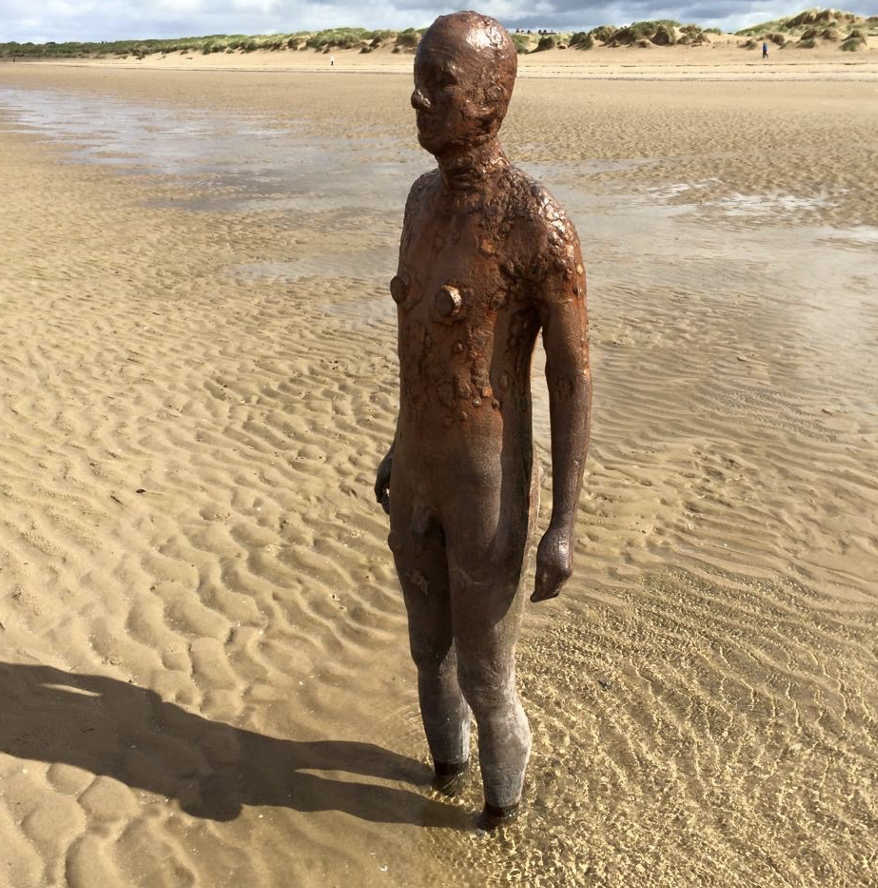
Both the hunter and hunted operate in a world of liminality. Both are folk devils in the sociological sense, as are children (Bourke, 2006 328-329; Cohen, 2011). As people push for recognition of self-identities that are beyond biological and chronological structures a complex legal blurring is occurring aided by online technologies. In our mediated world of violence, through the horrors of war, real or imagined terrorist atrocities, pandemics, and natural disasters, our ontological essence and behaviour is shaped by fear (Lee, 2009 2). Child abduction encapsulates this, as this threatens the foundation of our future. For control purposes, governments have a vested interest in stage managing each moment of horror, shaping the way we perceive and react to all events. This culture of fear grows along with the power of surveillance (Bourke, 2006). Danger lurks around childhood and the image, but just as childhood is worshipped so the image is sacred being concerned with immortality and cheating death. State violence, violence against children in the form of child sexual abuse, and the excesses of capitalism reinforce each other (Lee, 2005). Baudrillard's position regarding the total dominance of simulation seems extreme, but his view that the transparency of others represents "absolute danger" needs consideration (Baudrillard, 1993 122). Within this is the notion of the hell of the same, threatening consciousness of the self.
Our society is entirely dedicated to neutralizing otherness, to destroying the other as a natural point of reference in a vast flood of aseptic communication and interaction, of illusory exchange and contact. By dint of communication, our society develops an allergy to itself. By becoming transparent in its genetic, biological and cybernetic being, the body even develops an allergy to its own shadow. Otherness denied becomes a spectre and returns in the form of a self-destructive process. This, too, is the transparency of Evil. (Baudrillard, 1993 122)
Wars, disaster responses, catastrophes, and moral panics are so fully privatized that they are themselves the new market. While child protection needs to be paramount, reports of a man ignoring a drowning child for fear of being accused a molester, and of a parent being attacked for photographing their own child in a park are not just urban myths. They reveal the deathly depth of our level of fear and mistrust. A real transgression from fear would be an ability to trust, but through the destabilization of the image and reality via the media this is a herculean task. In India and in Russia under the guise of child protection those holding different religious and political beliefs are attacked, ending up in mistakes and deliberate crimes, including murder, with financial incentives behind these allegations.
"God is nothing if not the surpassing of God, we cannot really have the word in our language as it surpasses speech, it is everything and everywhere" (Bataille, 1997 226). And what of a metaphysical surveillance? "God knows that if he were to show himself, he would cease to exist" (Baudrillard, 2007 17). Some Christians may find this offensive, but perhaps this means the unknown God would cease to exist. According to Baudrillard the ruse of capital is akin to the ruse of God in the Christian sense: redeeming man's debt by the sacrifice of His son creates a situation where the debt cannot be redeemed by the debtor, since it has already been redeemed by the creditor. For Baudrillard all is predetermined (Lee, 1999 9). A search for purity continues in a virtual sense given there is a striving:
for an equivalent to the Kingdom of God, this fanciful eradication of negativity and evil that is the virtual and the hyper–secular version of redemption and it is profoundly destructive – of the natural world, of any difference or otherness, and ironically, of human freedom. (Walters, 2013 57).
The subterfuge of surveillance and capital plunges the world into greater debt, working simultaneously to redeem that debt, but it is unable to as this will never get cancelled or exchanged for anything (Walters, 2013 57). Meaning may have imploded through the asocial process of the media, but Baudrillard also desires immanence, claiming the masses are locked in paganism through a belief in the here and now of a Godly kingdom on earth (Baudrillard, 1983 7). Baudrillard claims we have all been everywhere in some past life, but this fantasy has nothing to do with ubiquity caused by technological realities despite the brain being able to experience, "the space-time of a spectral metempsychosis of the future" (Baudrillard, 2013 163). It is the, "present moment which is an image of eternity, not an infinite succession of such moments" (Eagleton, 2007 101). We could see such an intended liberting view as limiting and prefer to transgress its temporal confines. A virtual reality technological utopia is nothing weird or novel, but stems from at least the twelfth century when technology was "perceived as a tool for precipitating the promised time of perfection" (Wertheim, 1999 41).
Theologically the deepest surveillance and observation, in some sense collapsing subject and object, is carried out by an all-seeing God regarded in Christian trinitarian theology as both the final Other (God the Father) and the original Same (Christ), each distinct yet one and united through the Spirit who is also distinct but one with the three. Following Spinoza, true cognition is only possible in God.
It is knowledge sub specie aeternitatis, rather as theory for Althusser is without history. To see the world properly is to see it, so to speak, from its own standpoint; and this involves a shift from the imaginary, in which knowledge is refracted by desire, to the moral maturity of the symbolic. We must cease, in St Paul's words, to see through a glass darkly, and instead adopt a God's-eye-view of ourselves, serene in the knowledge that neither ourselves nor anything else in the cosmos could have been other than what they are. (Eagleton, 2009 98)
Try telling that to a parent whose child has been abused. Surveillance and the market go hand in hand, so in this sense we do not have to prefer Deleuze over Foucault, the former claiming the operation of markets is the instrument of social control, superseding the disciplinary panopticon. Developing Deleuze, we can uphold the territorialized corporate global soul is fused with the global market via corporate surveillance. The corporate-state has an automated granular knowledge of movements and activities with an absence of human accountability. Given there is no autonomy without privacy, corporate governance of the public and private sphere removes any prerogative to privacy through surveillance in all spheres. The digital prison infrastructure that transcends physical prison walls is normalized. Our digital carceral infrastructure is an infinite prison, impossible to remove once in place, combined with techno-governance in a counterfeit attempt to manage risk (Wang, 2017). This is an aspect of the administration of fear within turbo-capitalism, where the speed of information manages being (Virilio, 2012).
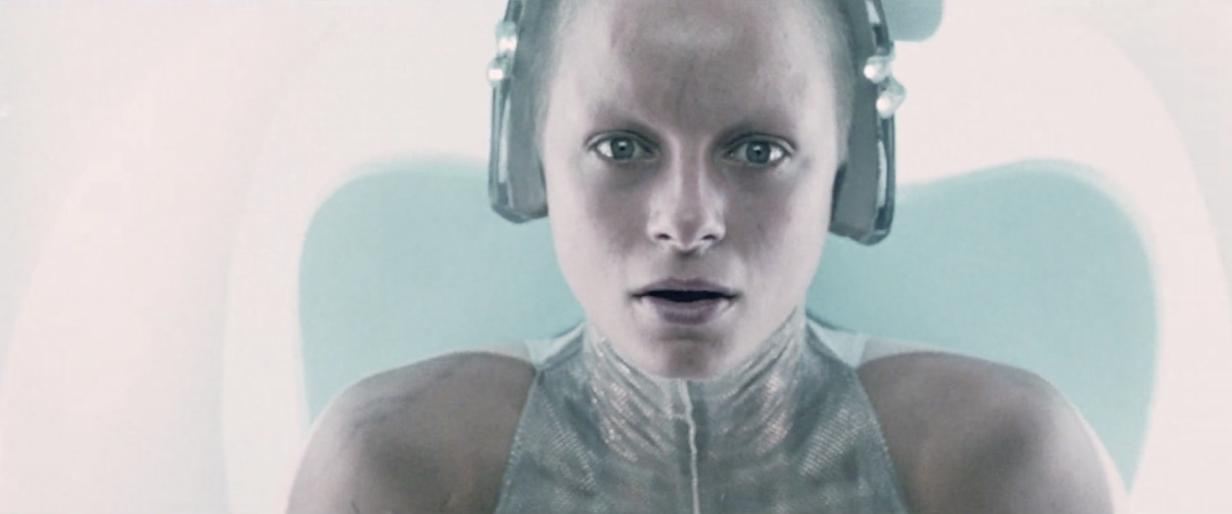
A version of Minority Report (Spielberg, 2002) is reality. By May 2021 the UK was considering giving those arranging a sexual offence a high jail sentence, whether abuse took place or not, the maximum jail term being 14 years. This included those caught by online sting operations run by the police and by paedophile hunter groups (Casciani, 2021) (Courts could punish paedophiles on intent not harm - BBC News). A former Facebook moderator from Ireland, Isabella Plunkett, claimed that due to graphic content on Facebook people who moderated content suffered mental health issues (Plunkett in Criddle, 2021). There is evidence that excessive viewing of graphic images in a professional context causes mental health problems, including post-traumatic stress disorder (Lee, 2021). Through machine learning algorithms and human moderators reviewing graphic content Facebook claimed they were already dealing with this issue of graphic images and child abuse well and moving towards reducing human input on moderation (Criddle, 2021) (Facebook moderator: "Every day was a nightmare" - BBC News).
The UK government attempted a crack down on children using these platforms in 2021. Users normally self-declare their age with no proof. Children under 13 are not allowed to sign up to Facebook, Twitter, Instagram, and YouTube, those under 12 barred from creating a Google account, with WhattsApp having a minimum age of 16 although some existing users aged 13 to 16 still have accounts. This move by the UK government was intended to give greater legal powers to insist social media platforms enforce minimum ages via ID proof, in the same way betting firms verify customers are over 18 (Dathan, 2021). Facebook responded by claiming their "industry-leading transparency reports" reveal they are already removing harmful content before anyone reports it; they backed the new rules, and desired private companies to not make decisions alone (Dathan, 2021).
The Baudrillardian view that communication and soul is nullified through over-information with a removal of the human internal world has been confirmed in this article. All is appearance and often difference is inconsequential with history and facts meaningless in a QAnon world. Perhaps it would be natural that during the COVID-19 pandemic lockdowns, when use of the external physical world was restricted, a re-engagement with the depth of the internal world and the depth of the human would arise. In reality for many it meant even more time on screens away from the human, but for Baudrillard reality was already removed prior to this. He interestingly notes the "psychical pollution" of humans is greater than the technological (Baudrillard 2007 34). Belief in life consents to both difference and the same. We live a binary world of code often with indifference to the non-binary position.
As we have seen, the hunting of suspected paedophiles through local groups like Dark Justice on Facebook, random mobs, through WhatsApp shaming, or by more diverse groupings like QAnon, brings meaning and purpose. Their growth would not have happened without Facebook, ideological austerity measures that impacted on police forces and regions in terms of employment plus education. Belief in a wider satanic paedophile conspiracy brings media attention and this is often validated by the state in Trump's case and enabled by Facebook and other platforms. Vigilante groups have always existed, but with Facebook these groups themselves are put under surveillance creating heightened sensationalist publicity. Governments threatened by Facebook's power argue over whether it should be broken up. "Dark design" within even benevolent online choice architecture has involved inertia by users, meaning data has unknowingly been given away (Kalliris, 2021). There is a need for the limit, unlimited surveillance a conduit for a priori determinism and abuse due to algorthym design. This removes the moment encompassing the infinite, as it creates the moment prior to the event, just as unlimited surveillance destroys sovereignty and identity, initiating the most extreme transgression – the removal of the human.
Bio-note
Professor Jason Lee (CJP Lee) DPhil SFHEA CPsychol is the author/editor of 20 books, including: Nazism and Neo-Nazism in Film and Media (Amsterdam University Press, 2018); Sex Robots – The Future of Desire (Palgrave, 2017); Spit Roast (Roman, 2015); The Psychology of Screenwriting (Bloomsbury, 2014); Cultures of Addiction (Cambria, 2012); Unholy Days (Roman, 2011); Celebrity, Pedophilia, and Ideology in American Culture (Cambria, 2010); and Pervasive Perversions – Child Sexual Abuse and Paedophile in Media/Culture (Free Association Books, 2005). Jason Lee is Professor of Film, Media, and Culture at De Montfort University, UK, and a chartered psychologist. For further details: https://cjplee.com/
References
ABC News Team (2017) "37-year-old accused of posing as young boy online," ABC News, 5 December, https://www.abc12.com/content/news/37-year-old-accused-of-posing-as-young-boy-online-seeking-inappropriate-photos-of-girls-462131393.html [accessed 18 June 2019]
Ahmed, S. (2018) "In Assam, a Myth, WhatsApp and Lack of Faith in Justice System Have Fuelled Lynchings," The Wire, 12 June, https://thewire.in/rights/assam-lynching-child-lifting-rumours [accessed January 21 2021].
Anon 2 (2019) Police concerns over rise of 'paedophile hunters' - BBC News [accessed May 20 2021].
Anon 1 (2019) "Facebook to pay record $5 billion to settle privacy concerns," BBC News, 24 July, https://www.bbc.co.uk/news/business-49099364 [accessed May 4 2021].
Anon (2018) "Paedophile Hunter Evidence Used To Charge 150 Suspects," BBC News, 10 April, https://www.bbc.co.uk/news/uk-england-43634585 [accessed January 21 2021]
Anon (2012) "Paedo's Net Trap," The Mirror, https://www.mirror.co.uk/news/uk-news/paedos-net-trap-455647 [accessed January 21 2021].
Aronovitch, D. (2021) "Why we go crazy in crowds," The Times, May 15, p. 17
Baer, J (2018) "Facebook Usage Declined," Convince and Convert, https://www.convinceandconvert.com/social-media-measurement/facebook-usage-declined-3-reasons/ [accessed January 21 2021]
Bailey, S. (2019) IICSA Report https://www.iicsa.org.uk/publications/investigation/custodial/part-e-institutional-response-child-sexual-abuse-custody/e13-recording-and-auditing [accessed January 21 2021]
Bataille, G. (1997) The Bataille Reader, eds. Fred Botting and Scott Wilson. Oxford: Wiley.
Baudrillard, J. (2013) The Intelligence of Evil – Or the Lucidity Pact, trans. Chris Turner. London: Bloomsbury.
Baudrillard, J. (2007) Fragments – Cool Memories III, 1990 – 1995, trans. Emily Agar. London: Verso.
Baudrillard, J. (2006) Simulacra and Simulation, trans. Sheila Faria Glaser. Ann Arbour: University of Michigan Press.
Baudrillard, J. (2005) The System of Objects. London: Verso.
Baudrillard, J. (1993) The Transparency of Evil, trans. James Benedict. New York: Verso.
Baudrillard, J. (1983) In the Shadow of the Silent Majorities or The End of the Social and Other Essays, trans. Paul Foss, Paul Patton and John Johnston. New York: Semiotext(e).
Bogard, W. (2006) "Security, Exception, Ban and Surveillance," in D. Lyon (ed.) Theorising Surveillance: The Panopticon and Beyond. Cullompton, UK: Willan.
Booth, R. (2013) "Vigilante Paedophiles Ruining Lives with Internet Stings," The Guardian, 25 October, https://www.theguardian.com/uk-news/2013/oct/25/vigilante-paedophile-hunters-online-police [accessed January 21 2021].
Bourke, J. (2006) Fear. A Cultural History. London: Virago.
Bowden, G. (2018) "Sajid Javid – 80,000 threat online," Huffington Post, 3 September 2018,
https://consent.yahoo.com/collectConsent?sessionId=3_cc-session_6e216e7e-65e0-4b28-8161-a6d37d4a7d9d&lang=en-gb&inline=false [accessed January 21 2021].
Bridle, J. (2019) New Dark Age. Technology and the End of the Future. London: Verso.
Brooks, L. (2021) https://www.theguardian.com/law/2020/jul/15/paedophile-hunters-do-not-violate-human-rights-court-rules [accessed May 5 2021].
Casciani, D. (2021) "Courts punish paedophiles on intent not harm," BBC News, 13 May, Courts could punish paedophiles on intent not harm - BBC News [accessed May 13 2021].
Chabria, A. "QAnon now pushes alarming conspiracy myths targeting China and Jewish people," Los Angeles Times, March 23 2021, QAnon shifts, spreading Chinese and Jewish conspiracy myths - Los Angeles Times (latimes.com) [accessed May 5 2021].
Chandler, P. (2019) Resort link to royal scandal snap | Otago Daily Times Online News (odt.co.nz)
[accessed May 5 2021].
Clarke, R. (1991) "Information Technology and Dataveillance," in C. Dunlop and R. Kling eds. Computerization and Controversy: Value Conflicts and Social Choices. San Diego: Academic Press.
Cohen, S. (2011) Folk Devils and Moral Panics. London: Routledge.
Criddle, C. (2021) "Facebook moderator: 'Every day was a nightmare'," BBC News, 12
May, Facebook moderator: 'Every day was a nightmare' - BBC News [accessed May 13 2021].
Cunningham (2021) "Child groomer caught by 7 paedophile hunter groups" Eastern Daily Press, January 25, https://www.edp24.co.uk/news/crime/paedophile-hunters-caught-michael-camp-diss-grooming-children-7070398 [accessed May 20 2021].
Dado, K. (2018) Cambridge Analytica aurait partagé des données avec le renseignement russe (Christopher Wylie) - KoldaNews [accessed May 5 2021]
Dandeker, C. (1990) Surveillance, Power and Modernity: Bureaucracy and Discipline from 1700 to the present day. Cambridge: Polity.
Dark Justice (2019) https://darkjustice.co.uk/ [accessed July 17 2019]
Dathan, Matt (2021) "Social media users face age check under new rules to protect children," The Times, May 13, p. 4.
Davies, D. (2015) In Plain Sight: The Life and Lies of Jimmy Savile. London: Quircus.
Day, L. (2020) Five separate paedophile hunter groups caught out man trying to send explicit messages to underage girls - Wales Online [accessed May 19 2021]
Dearden, L. (2020) Paedophile hunters "could jeopardise criminal proceedings", study warns | The Independent | The Independent [accessed May 20 2021].
Deleuze, G. and Félix Guattari (2011) A Thousand Plateaus – Capitalism and Schizophrenia, trans. Brian Massumi. London: Continuum.
Demianyk, G. and Sophie Gallagher (2019) "Social Media Platforms Face Regulation," Huffington Post, 8 April, https://www.huffingtonpost.co.uk/entry/social-media-uk-government_uk_5caa341fe4b0dca033030815 [accessed January 21 2021].
Drury, C. (2019) https://www.independent.co.uk/news/uk/home-news/paedophile-hunters-leeds-arrest-police-wakefield-child-abuse-assault-a8763476.html [accessed January 21 2021].
Eagleton, T. (2009) Trouble with Strangers: A Study of Ethics. Oxford: Wiley.
Eagleton, T. (2007) The Meaning of Life. Oxford: Oxford University Press.
Elias, D. and Eric Dunning (1986) The Quest for Excitement – Sport and Leisure in the Civilizing Process. Oxford: Wiley.
Ericson, R. and Kevin Haggerty (1997) Policing the Risk Society. Oxford: Clarendon Press.
Erol, A. (2017) Will the Internet be the Death of Metaphysics? - Public Seminar [accessed May 27 2021].
Foucault, M. (2002) The Order of Things – an archaeology of the human sciences. London: Routledge.
Gandy, O.H. (1993) The Panoptic Sort: A Political Economy of Personal Information. Boulder, CO: Westview Press.
Geesin, B. (2012) "Resistance to surveillance in everyday life," unpublished PhD thesis, University of York.
Giddens, A. (1990) The Consequences of Modernity. Cambridge: Polity.
Hadjimatheou, K. (2019) "Citizen-led digital policing and democratic norms: The case of self-styled paedophile hunters," Criminology and Criminal Justice, October.
Hamilton, F. (2021) "MI5 accuses Facebook of giving help to terrorists", The Times, May 21, p. 1.
Harpin, L. (2021) "British businessman who flew QAnon flag over hotel shares false Soros claims," January 22, British businessman who flew QAnon flag over hotel shares false Soros claims - The Jewish Chronicle (thejc.com) [accessed May 5 2021].
Holloway, H. (2021) "QMonsters – QAnon fuels kidnappings from France to US as brainwashed snatchers try to 'save kids from blook-drinking paedos'", The Sun, April 21, QAnon fuels child kidnappings from France to US as brainwashed snatchers try to 'save kids from blood-drinking paedos' (thesun.co.uk) [accessed May 6 2021].
Holy Bible (1996) New International Version. Grand Rapids, Michigan: Zondervan.
Iqbal, M. (2021) WhatsApp Revenue and Usage Statistics (2021) - Business of Apps [accessed May 18 2021]
Kalliris, K. (2021) "'Dark Design' in social media, Autonomy, and Freedom of Expression", Research Seminar for the Centre for Law, Justice, and Society, De Montfort University, 4 May.
Kearney, V. (2018) "Paedophile hunters charged with criminal offences," https://www.bbc.co.uk/news/uk-northern-ireland-43049316 [accessed January 21 2021].
Laclau, E. (1990) New Reflections on the Revolution in our Time. London: Verso.
Lawrence, D. and Gregory Davis (2020) "QAnon in the UK – The Growth of a Movement," Hope Note Hate, October, qanon-report-2020-10-FINAL.pdf (hopenothate.org.uk) [accessed May 5 2021].
Lee, J. (2021) "Post-traumatic stress disorder in the film's Taxi Driver and You Were Never Really Here: a comparative approach," in Normalizing Mental Illness and Neurodiversity in Entertainment Media – Quieting Madness, eds., Malynnda Johnson and Christopher J. Olson (London: Routledge).
Lee, J. (2019) Academics should not be so wary of researching royalty | Times Higher Education (THE) [accessed May 5 2021]
Lee, J. (2018) Nazism and Neo-Nazism in Film and Media. Amsterdam: Amsterdam University Press.
Lee, J. (2017) Sex Robots – The Future of Desire. London: Palgrave.
Lee, J. (2015) Spit Roast. London: Roman Books.
Lee, J. (2014) "Terminal Thinking: Corporate University and Creativity," Three-D, Issue 21, Three-D Issue 21: Terminal Thinking: Corporate University and Creativity – MeCCSA [accessed January 21 2021].
Lee, J. (2009) Celebrity, Pedophilia and Ideology in American Culture. New York: Cambria.
Lee, J. (2005) Pervasive Perversions – Paedophilia and Child Sexual Abuse in Media/Culture. London: Free Association Books.
Long, B. and Bob McLachlan (2002) Monsters and Men. London: Hodder and Stoughton.
Los, M. (2006) "Looking into the future: surveillance, globalization and the totalitarian potential," in D. Lyon (ed) (2006) The Search for Surveillance Theories – The Panopticon and Beyond. London: Willan.
Madrigal, A. (2018) "India's Lynching Epidemic and the Problem with Blaming Tech," 25 September, https://www.theatlantic.com/technology/archive/2018/09/whatsapp/571276/ [accessed January 21 2021].
Marsh, S. (2020) "Councils let firms track visits to webpages on benefits and disability," The Guardian, 4 February, https://www.theguardian.com/technology/2020/feb/04/councils-let-firms-track-visits-to-webpages-on-benefits-and-disability [accessed January 21 2021]
Marshall, F. (2018) "Vigilante Paedophile Hunters Investigated," Telegraph, 10 May, https://www.telegraph.co.uk/news/2018/05/10/vigilante-paedophile-hunters-investigated-police-gang-eight/ [accessed January 21 2021].
McIntyre, N. and David Pegg (2018) "Councils use 377,000 people's data in efforts to predict child abuse,'' The Guardian, 16 September, https://www.theguardian.com/society/2018/sep/16/councils-use-377000-peoples-data-in-efforts-to-predict-child-abuse [accessed January 21 2021].
Mejia, Z. (2018) "Meet Christopher Wylie, the millennial whisteblower behind Facebook's data controversy," CNBC, May 19, 4 facts about Facebook data whistleblower Christopher Wylie (cnbc.com) [accessed May 11 2021].
Mineo, L. (2017) "'Surveillance is the business model of the internet,' Berkman and Belfer fellow says," The Harvard Gazette, 24 August, https://news.harvard.edu/gazette/story/2017/08/when-it-comes-to-internet-privacy-be-very-afraid-analyst-suggests/ [accessed January 21 2021].
Mouffe C. (2005) The Return of the Political. London: Verso.
Ogura, T. (2006) "Electronic Government and Surveillance-Oriented Society", in D. Lyon (ed) Surveillance Studies: An Overview. Cambridge: Polity Press.
Perkins, V. (1988) Film as Film – Understanding and Judging Movies. London: Penguin.
Perraudin, F. (2017) "Paedophile hunters jeopardising police work, says senior officer," The Guardian, 24 April, https://www.theguardian.com/society/2017/apr/24/paedophile-hunters-jeopardising-police-work-child-protection [accessed January 21 2021].
Purshouse, J. (2020) "Padophile Hunters", Criminal Procedure, and Fundamental Human Rights, Jounral of Law and Society, Vol. 47, Issue 3, pp. 384-411.
Rizzo, S. (2008) The Promise of Cell Phones: From People Power to
Technological Nanny. Convergence: The International Journal of Research
into New Media Technologies, 14(2), 135-143.
Robinson, M. (2016) "Married paedophile faces jail after vigilantes trapped him trying to meet children for sex at Peppa Pig theme park - while he was there with his wife to celebrate their anniversary," Mail Online, 8 July, https://www.dailymail.co.uk/news/article-3680923/Caught-video-Married-paedophile-faces-jail-vigilantes-trapped-trying-meet-children-sex-Peppa-Pig-amusement-theme-park.html [accessed January 21 2021].
Russell-Prywata, L. (2018) Book Review: Automating Inequality: How High-Tech Tools Profile, Police and Punish the Poor by Virginia Eubanks | LSE Review of Books [accessed May 25 2021]
Saunt, R. (2021) FALSE claims by paedophile hunters drove me to Beachy Head | Daily Mail Online [accessed May 20, 2021].
Schroeder, C. (2013) "Cop poses online as teen girl to catch predators," The Cincinnati Enquirer, 26 July, https://eu.usatoday.com/story/news/nation/2013/07/26/cop-poses-online-as-teen-girl-to-catch-sexual-predators-/2591619/ [accessed January 21 2021].
Shammas, J. (2018) Cops now rely on paedophile-hunter vigilantes in HALF of grooming cases (thesun.co.uk) [accessed May 19 2021].
Sontag, S. (1986) On Photography. London: Penguin.
Staff Writers (2015) "Brendan Collins and daughter Leah team up to hunt paedophiles online", Brendan Collis: Father uses daughter Leah to catch paedophiles (news.com.au) [accessed May 19 2021.
Travis, A. (2017) "Simple Numbers tell Story of Police Cuts Under Theresa May," The Guardian, 5 June, https://www.theguardian.com/uk-news/2017/jun/05/theresa-may-police-cuts-margaret-thatcher-budgets [accessed May 25 2021].
Virilio, P. (2012) The Administration of Fear, trans. Ames Hodges. New York: Semiotext(e).
Wacks, R. (2010) Privacy. Oxford: Oxford University Press.
Walters, J. (2013) Baudrillard and Theology. London: Continuum.
Wang, J. (2017) Carceral Capitalism. New York: Semiotext(e).
Warder, R. (2014) "10 Controversial Cases of Vigilantism," Listverse, https://listverse.com/2014/01/30/10-controversial-cases-of-vigilantism/ [accessed January 21 2021].
Weil, S. (1992) Gravity and Grace. London: Routledge.
Willis, D. (2006) "The articulation of identity in discourses of surveillance," unpublished PhD thesis, University of Nottingham.
Wong, J (2020) Down the rabbit hole: how QAnon conspiracies thrive on Facebook | Facebook | The Guardian [accessed May 19 2021]
Wright, P. (2015) "Mum "who tortured kids" to invent Hampstead Satanic abuse fantasy loses appeal," Ham & High, August 7, Mum "who tortured kids" to invent Hampstead Satanic abuse fantasy loses appeal | Hampstead Highgate Express (hamhigh.co.uk) [accessed May 11 2021].
Yeomans, E., Tom Ball, and Andrew Ellson (2021) "Cornish hotel flies flag for cult delusion," The Times, January 16, 13.
